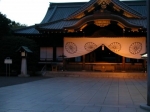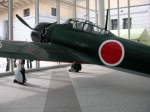06 July 2006
Famous Japenese Businessman's scandal
Takafumi Horie, commonly known as Horiemon, enjoyed popularity in the media until last year as a hero of the times. With an unveiling of realities of business operations of Livedoor that he once managed, Horiemon is currently tumbling down the hill thrown in the midst of scandal. While criticism intensifies, surprisingly, there persist comments defending on his behalf. Could it be that many people, somewhere in the back of their heads, feel guilty criticizing Horiemon? Advent of Horiemon had brought about an expectation that he may be the antithesis to rejuvenate social stagnation. This is precisely the reason why a climate rose to overlook some of his problematic behaviors, and in a sense, it has become impossible to stop him from going overboard. Japanese youths have lost their energy. Due to the constraints put upon them by the older generation, they are not allowed to live freely and vivaciously. Elders, on the other hand, just complain about younger generation without providing any kind of advice. The elder generation conveys strong image of being stubborn, and contrary to expectation, they are ignorant and pigheaded. Seeing this from the point of fostering athletes in Japan and other countries, the difference can be explained as difference between lawn fields, that is common in the US and European countries, to mud fields, that is common in Japan. The reason European players can exhibit dynamic plays in the soccer and rugby games is because they practice mostly on a lawn field. Lawn plays the role of a cushion, and even if a player should trip and fall, they will not be hurt so badly. On the other hand, if a player falls on a mud field, there will be clouds of dust and player is more likely to end up with injuries. So players would not be able to take on dynamic actions for the fear of possible injury. The same situation exists in social realm. Unlike society with green lawn, outstanding human resources are difficult to breed in an intolerant society where damage is huge when failed thereby losing challenging spirits. This could be a cause of decline of a country. Could it be that many people are beginning to sense such crisis for the country? With the Horiemon uproar, there has been more and more of conservatives screaming for educational revision and to breed patriotism, but this would only make things worse. So what are they trying to do? Change mud fields into concrete field and stop youths from doing anything? This is also interrelated to decline of birthrate. In the present society, children cannot grow up healthily and freely. It is alright for them to take on challenge, but there will always be a fear that they may be bashed when failed. Raising children in such an environment causes more concern than financial circumstances. In a society like this, people will be better off to remain single and being carefree from marriage or family. With this, people feel less and less a part of a society and society not only loses all vitality but transforming into dangerously uncontrollable world. Ironically, Horiemon uproar may be sounding off a warning for this. It is truly the price we must pay for creating such an intolerant society.
23:15 Posted in Japan News | Permalink | Comments (0) | Tags: Japan
05 January 2006
"Memoirs of a Geisha" from Japanese perspective
I went to see the movie "Memoirs of a Geisha." Here in Japan the title was changed to "SAYURI."
The movie was kind of strange but also very interesting.
The characters in the movie speak in English. The hairstyle of the Geishas were appearently different from real Geishas walking on the streets in Kyoto.
The story was good in first half but the latter half was kind of difficult to understand. I actually did not like the story.
Some of Japanese argue Japan portrayed in that film was too strange to see. But how many of Japanese know the old time Japan, especially the life of Geisha? How many of us know how to wear traditional kimono?
So in that sense Hollywood made the best of their efforts.
One thing I find they are better than Japanese films is the scenes of the evening party. Usually those scenes are very bright like today's party room with fluor lamps on the ceiling. That never happened in 1930's. But in the movie "Memoirs of a Geisha," the room was not very bright and the Geisha's face was lit by orange paper lantern. That should be real scenes of those days, I think.
The thing I was kind of disturbed by was the main character was played by Chinese actress, Zhi Zhang. She is a great actress, but the point is the character she played might aggravate Chinese people. The story took place in 1930's Japan. It was a time Japan was invading China. The Geisha fell in love with Japanese rich man who once fought in Manchuria. Then after the war she helped him with reconstructing his business sleeping with American military man.
Today is the time the relationship between China and Japan has become worst in post-war time. It is due to our stupid prime minister and his uneducated conservative supporters.
As one of Japanese citizen who is very aware of how apologetic Japan should be to China, I could not enjoy this movie although the Chinese actress did played that role as Hollywood actress.
22:55 Posted in Culture, Film, US-Japan relationship | Permalink | Comments (2) | Tags: geisha, japan, kyoto
04 November 2005
Japanese media's role in supporting atrocities of WW2

60 years have passed after Japan’s surrender in World War II, the citizens of Japan are able to speak about how much pain and suffering that they experienced as a result of the war, yet we are unable to discuss how much pain and suffering that Japan caused the citizens of other nations. To discuss such things one runs the risk of being labeled masochistic. Those in mass media willing to report upon the country’s responsibility for the atrocities that occurred during the war are also few and far between. Why do they not wish to cover such stories? One might reason that this is because the media reflects public opinion, but this is not the entire explanation. Rather it is also because the media itself bears a portion of blame.
The photo shows an article in the August 5, 1937 edition of the Asashi Newspaper.The headline reads, “3.5 Million Yen! A Glorious Monument to Patriotism”. The article contains a report on the collection of 3.5 million yen in donations and introduces some of the donors following the Asahi Newspaper’s collection of donations for the production of military aircraft. Even a mother and her child in elementary school are featured among the donors. However, the reality is that the military aircraft produced from these donations was flown to China and used to bomb such cities as Chongqing resulting in the slaughter of innocent civilians. Many people would probably be surprised to hear that the Asahi Newspaper collected donations for production of military aircraft. Considering that the newspaper is known for being a large liberal media outlet which often covers Japan’s accountability for war crimes such as the issue with so-called “comfort women” and the Nan king Massacre. The Asahi Newspaper may now even seem pacifist with its recent critical position towards the Japanese Self Defense Forces participation in Iraq, but this was not the case just prior to World War II. In fact, it may be more accurate to say that this was not the case for the period between the Manchurian Incident and the end of the war. Prior to the Manchurian Incident, which thrust Japan into the messy quagmire of the 15 year war to follow, the Asahi Newspaper objected to the dispatch of troops to Siberia during the Taisho Period (1911-1926) and further took the position of moderates who were in favor of a peaceful resolution without the use of military force to protect Japan’s interests in Manchuria.
Why then did this position change? It is generally understood that this change was due to the boycotts that occurred after the outbreak of the Manchurian incident in 1931. As a public weary of the economic recession leaned towards military fervor, Asahi found that it’s stance contrary to other media and not in sync with military views resulted in a drop in its sales. After this, the Asahi Newspaper editorial policy changed drastically.
Prior to the war, it is generally said that newspapers, magazines, and other media could not criticize the military because they were subject to intense scrutiny by authorities and laws limited their freedom of speech. However, this was not the only reason. Mass media of this era not only failed to criticize, it became a backer in a sense fanning the flames of war. It chose to support the war in an effort to increase circulation and sales. In other words, it did so in tune with the public opinion of the time which was in favor of war. This same phenomenon is at work today. Great example is US media's reports on wars in Afghanistan and Iraq.
The Frankfurt School, established by Jewish Scholars who defected from Nazi Germany, is critical of mass media which takes this position. It says that the press and mass media should above all take a neutral and impartial position and should not curry favor with emotional public opinion. It is thought that the spread of Nazism in Nazi Germany was due to the bolster support provided by mass media. At that time it appeared that the papers’ sales grew and stimulated national opinion, but in fact mass media lost sight of the all important truth and dragged society in an utterly inane direction Germany, a defeated nation like Japan, chose to abolish all of the newspapers which bolstered the Nazi regime. Yet in Japan, the mass media of the prewar period survived. Moreover, it has yet to apologize to the public for the role that it played in World War II, and to this day the press club system symbolic of the cozy relationship between mass media and government officials still thrives. In fact, this may be why none of the Japanese newspapers are willing to own up to the past. It is for this reason that we, along with mass media, are unable to fully own up to our accountability and the circumstances of Japan’s defeat in the war.
On this, the sixtieth year after the end of the war, shouldn’t the media take this chance to recognize its past role in the tragedies of World War II to and apologize to the Japanese public? Moreover, shouldn’t it use this as an opportunity to apologize to the citizens of all of the countries in Asia which suffered as a result of invasions by Japan? In addition, it is imperative that we, as the passive readers and the consumers of mass media, use this opportunity to reflect on history and reexamine ourselves. We are now in the age of the internet in which media is not just limited to newspaper, television, and radio. It is time to broaden our intellect to fight back against the prevailing mass media that contorts the truth to cater to the masses. Furthermore, it is essential that we endeavor to promote the advancement of media that no matter the circumstances always meets the truth head on.
21:10 Posted in Media | Permalink | Comments (1) | Tags: political issues, history, Japan
20 October 2005
Fucking Prime Minister Visits War Criminals' Shrine

Prime Minister Koizumi is idiot.
He is just making our country worse. He visited the controversial shrine which honours war criminals responsible for Japan's invasion of China. The shrine insists the war was just and liberated Asians from western imperialism. That is not true. The Japanese army killed many, many Asian civilians there.
Asian victims and their familes never forget that.
Half of Japanese citizens including me oppose his visit to the shrine. business people, too.
Prime Minister says it was private visit. Private? He went there with press. Since he is a PM, he can never be a private person.
For Americans, it should be great news, as Japan's relationship with China got worse, US government can get more dealing cards when it comes to negotiate with Japan or China. For China and Japan, it is just a bad card.
The top picture is the sanctury of the shrine.
The shrine has the museum that shows how bravely Japanese army fought in the war. The war Japan failed.
The below is picture of famous zero-sen air-fighter.






